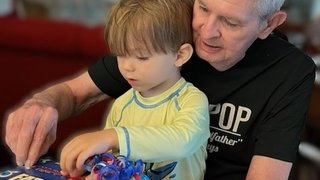A young neurologist diagnosed with ALS is inspiring a call to action
September 25, 2024

Michael Ibarra, M.D., a neurologist at UT Southwestern, was diagnosed with ALS at age 30. Amyotrophic lateral sclerosis is a disorder that affects motor neurons and gradually erodes the brain’s ability to control voluntary and breathing muscles.
Ever since he was a boy, Michael Ibarra was fascinated by the human brain – its complexities, its secrets.
The concept of lucid dreaming, which is the ability to retain conscious awareness in dreams, piqued his interest and eventually cemented his chosen career path: neurologist, a doctor who specializes in diagnosing, treating, and managing disorders of the brain.
Now, at age 32, he is an Assistant Professor of Neurology at UT Southwestern, and he has come face to face with one of the most complex and deadly medical mysteries in his field, ALS, or amyotrophic lateral sclerosis.
Ultimately, it leads to paralysis of the entire body.
Dr. Ibarra has helped many patients and their families cope with this most difficult of diagnoses, and he admits there is very little that can prepare you for it.
This time, though, he was the patient.
“I got the official diagnosis on March 1, 2023, and it felt like the world was spiraling before me. I was extremely devastated,” Dr. Ibarra recalls. He was 30 years old – the average age of diagnosis is 55, according to the ALS Association.

Most patients succumb to respiratory failure three to five years after symptoms emerge, according to the National Institute of Neurological Disorders and Stroke (NINDS). However, research suggests that 10% of patients survive a decade or longer. Physicist Stephen Hawking survived more than 50 years after his ALS diagnosis.
The irony of a neurologist being stricken by ALS – a disease that essentially traps the brain inside an unresponsive body – is not lost on Dr. Ibarra. But instead of caving to despair, he found a renewed sense of purpose.
In addition to devoting his attention to every patient he treats in the Clinical Center for Sleep and Breathing Disorders and teaching medical fellows at UTSW, he is now working on behalf of the 31,000 Americans affected by ALS by sharing his story, raising awareness, participating in clinical trials, and pushing for more research funding.
“He’s amazing,” says Jaya Trivedi, M.D., Professor of Neurology at UT Southwestern and one of Dr. Ibarra’s physicians. “Despite his ALS diagnosis, Michael continues to see patients, teach residents, and has made it his mission in life to be an advocate for this community.”

In the past year alone, he gave a Grand Rounds lecture to other physicians about his experience, spoke at a national ALS conference, and revived the 2014 Ice Bucket Challenge in time for its 10-year anniversary. Many of his colleagues immediately accepted the challenge and gathered on campus to be doused with icy cold water.
“He has an infectious enthusiasm and a smile that brightens everyone who spends time with him,” says Won Lee, M.D., Medical Director of the Clinical Center for Sleep and Breathing Disorders. “Dr. Ibarra has been a revelation for our sleep clinic team, as we serve patients with not only sleep disorders but neuromuscular respiratory conditions such as ALS. His story will inspire others.”
For a boy who wanted to study dreams, he admits there are nights when he drifts off and imagines a world without ALS. Or at least more effective therapies. But then he wakes up, heads off to work to help his patients and students, and continues his race against time.
“I had to tell myself, ‘Yes, I have ALS, and I can’t do anything about that. But I can still live my life,’” he says. “I’ve found support groups that have helped strengthen my mindset, and now I feel extremely motivated to make a difference.”
UTSW supports Dr. Michael Ibarra with 10-year ALS Ice Bucket Challenge
Twitches, tremors, and ‘a diagnosis of exclusion’
The first symptoms appeared six years ago. That’s when Dr. Ibarra noticed intermittent muscle twitches, or fasciculations, in his left shoulder. They were easy enough to dismiss at first, but then came the small tremors in his foot and hand, which gradually grew more uncontrollable.
His reflexes were hyperactive, too, and although ALS symptoms can present differently among individuals, Dr. Ibarra knew his aligned with the classic warning signs:
- Muscle twitches in the arm, leg, shoulder, or tongue
- Muscle cramps or tightness
- Muscle weakness in the arm, leg, or neck
- Slurred or nasal speech
- Difficulty chewing or swallowing
He consulted a fellow neurologist in 2021 and took an electromyography (EMG) test to assess his nerve and muscle function.
“I was still confident that it would not be ALS, despite what my brain was telling me,” says Dr. Ibarra, who was in the middle of a sleep medicine fellowship at the University of Rochester Medical Center in New York at the time.

The results showed signs of chronic muscle damage in several body segments. It was not a definitive answer, but it was foreboding enough.
“That EMG test was heartbreaking,” he says. “It was a huge shift in my life.”
Diagnosing ALS is a process of elimination, so that initial assessment led to a barrage of more tests and procedures. Doctors ordered MRI and CT scans of his brain and spinal cord. Dr. Ibarra also underwent a lumbar puncture, so specialists could extract a sample of cerebrospinal fluid to analyze it for infections, cancer cells, and other abnormalities that might provide an alternative explanation.
“ALS is a diagnosis of exclusion. Its symptoms can masquerade as other conditions, such as multiple sclerosis, cancer lesions in your neck or back, or nutritional deficiencies,” he explains. “There was a paradoxical disappointment I felt with each test. You generally never want a test to come back positive for anything, but every time I got a negative result, it brought me that much closer to an ALS diagnosis.”
When final confirmation came, preparing for the worst did not make the blow any easier to bear.
“Suddenly, I had to change all my plans for the future,” says Dr. Ibarra. “There was still a lot of uncertainty with how this would progress.”
He accepted a faculty position at UT Southwestern and relocated to Dallas, moving closer to family. In his new role, he quickly found a community.
“It has been really inspiring to watch how Michael has dealt so courageously with this illness,” says Elan Louis, M.D., M.S., Chair of Neurology at UT Southwestern. “He is an example to all of us in the department, and we are all here to support him.”
A glimpse into life with ALS
ALS gradually robs people of their ability to walk, speak, eat, and breathe on their own, and as that happens, the need for supportive care grows more pronounced. Doctors primarily focus on treating symptoms because it’s a disease without a cure and options are limited. Care plans typically entail prescribing medications for fatigue or muscle cramps, using mechanical ventilation or respiratory equipment for breathing problems, recommending physical and occupational therapy, and helping patients adjust to life with wheelchairs, leg splints, or other adaptive devices.
More than a year after his diagnosis, Dr. Ibarra now wears leg braces to help with stability and sometimes relies on voice-to-text commands to write. Tasks that were once easy take longer now, he explains. Despite living near his work, he rises two hours earlier to ensure he can arrive at the Sleep and Breathing Disorders Clinic by 8 a.m.
Being proactive and taking a holistic approach is key to living with ALS, Dr. Trivedi says. It’s the foundational principle of the ALS and Muscular Dystrophy Multidisciplinary Clinic at UT Southwestern. In addition to providing medical care, a centralized team helps people tackle the practical and emotional hurdles of their illness: applying for disability, arranging home health care, finding support groups, and communicating with insurance providers – a necessity as estimated annual costs of medical care can range from $16,000 to $200,000, according to a 2018 report from the Annual Journal of Managed Care.
“We have a physical therapist, occupational therapist, orthotist, social worker, counselor, speech therapist, respiratory therapist, neuropalliative care specialist, equipment specialist, and nutritionist. All of them work together in our multidisciplinary clinic to provide care to our ALS patients,” Dr. Trivedi says.

ALS doesn’t just wash away your physical strength, Dr. Ibarra adds, it can corrode your sense of self. Young patients, in particular, may find it a minefield to navigate socially.
“It can be very isolating. There is this loss of identity as who you are becomes entangled with what this disease is,” says Dr. Ibarra. “It’s driven me to ask myself, ‘What has my experience revealed? How can I challenge myself to be a better physician?’”
On a recent Monday morning in clinic, he greets worried patients and immediately puts them at ease.
“How was your trip? Tell me all about it,” he says and then exchanges travel stories before turning to doctor-patient business. “What can we do for you today?”
Dr. Ibarra doesn’t mention his own struggle with ALS unless a patient is visibly struggling and can benefit from his personal story.
“My role is to be their support system,” Dr. Ibarra says. “I’ll only have that conversation with them if I think it will be of comfort. That said, I don’t want to pull focus from them and make it about me.”
Advancing ALS research
ALS is not a disease that enters the public consciousness much these days. The Ice Bucket Challenge was probably the high-water mark.
At ESPN’s popular ESPY awards show this year, former NFL player Steve Gleason, who was diagnosed with ALS in 2011, was honored with the Arthur Ashe Award for Courage. His powerful speech, using an eye-tracking communication device attached to his wheelchair, was a stark reminder of how merciless the disease can be.

One study projected the number of global cases to spike by 69% by 2040.
Yet very little is understood about its cause. Men are slightly more at risk than women, according to the National Institute of Neurological Disorders and Stroke. Cases among white and non-Hispanic populations are the most prevalent, but it can affect people of all races and ethnicities. About 90% of ALS cases are considered sporadic, meaning they occur at random, unrelated to familial associations. Only about 10% of cases are associated with genetic mutations.
“ALS is a very complex disorder, and the exact cause is unknown in a majority of the cases,” Dr. Trivedi says. The three FDA-approved ALS medications that exist can only prolong survival by a few months:
- Tofersen (Qalsody): A spinal injection given specifically to patients with a genetic variation of ALS
- Edaravone (Radicava): An antioxidant drug that can be administered orally or intravenously
- Riluzole (Rilutek): An oral medication, available in liquid and tablet form
A fourth drug made of sodium phenylbutyrate and taurursodiol (Relyvrio) gained FDA approval in 2022, but it was withdrawn from the market after subsequent clinical trials failed to confirm its efficacy.
“That felt like a gut punch,” says Dr. Ibarra, who hopes to broaden the scope of research in this arena. He participated in a platform trial conducted by the Healey Project based at Massachusetts General Hospital, which evaluates multiple drugs through simultaneous clinical trials. “If the results are not effective, they halt the trial and move on to the next prospective drug, which is an advantage because there is an urgent need.” Other organizations, like ALS Therapy Development Institute (ALS TDI), offer tools to match patients to compatible clinical trials, and the U.S. government provides a similar service at www.clinicaltrials.gov.
Dr. Ibarra’s colleagues also hope to forge change on their own. Just this year, Chun-Li Zhang, Ph.D., Professor of Molecular Biology at UT Southwestern and Investigator in the Peter O'Donnell Jr. Brain Institute, led a study that identified a molecular compound that could potentially slow the progression of ALS.
Dr. Lee from the Clinical Center for Sleep and Breathing Disorders recently served on a national committee through the National Academy of Sciences focused on ALS treatments and improvements in quality of life. The committee’s report titled “Living with ALS” includes recommendations for public policy changes.
Navigating the challenges of ALS firsthand has galvanized Dr. Ibarra to focus on educating patients and caregivers and providing them with much-needed resources. He also recommends working with groups like The ALS Association, I AM ALS, and Her ALS Story.
“It’s a tough situation,” he says. “As someone living with ALS, I would tell friends and families that the best thing they can do for their loved one is to ask, ‘How can I help you? What do you need from me?’”
Dr. Ibarra also launched a WhatsApp group for patients under 40 that quickly ballooned to 150 members in two months. Together, they have found strength in numbers – and in the neurologist who is battling ALS right alongside them.
“It’s been a journey of ups and downs,” he says, “but I’m honored to be part of such a great community. Those who know me know I can be stubborn sometimes, and I promise I’m not going anywhere anytime soon.
“I’m going to continue to fight, and I’m going to make the world a better place.”
Join the fight: ALS resource and research groups
Learn more about ALS, resources, and research news through these organizations:










